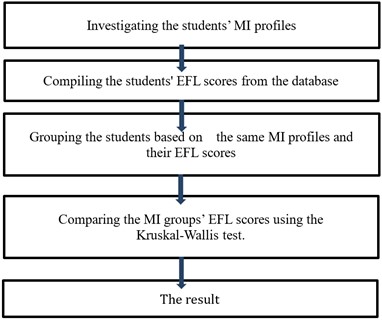Multiple Intelligence and the Performance of Indonesian EFL Learners
Abstract
Many ways of EFL teaching have been practiced by EFL teachers to optimally improve the learners’ performance in English. However, the results of the teaching many times did not meet our expectations. Therefore, this research aims to find a possible better way of teaching EFL by considering the students’ multiple intelligence (MI). A quantitative method of ex post facto design was conducted. The data were collected from the students of EFL learners studying English in the Department of English Education, Cenderawasih University, consisting of 236 students as the subject of the research. The data analysis used a non-parametric test, Kruskal Wallis, to compare the groups’ scores. The result shows that there is no significant difference in performance among the groups of MI. This result suggests that MI does not influence EFL learners’ English performance. This might be caused by the teaching strategies practiced by the lecturers who did not consider MI in their teaching processes. Therefore it is suggested to conduct further comprehensive research on the influence of multiple intelligence-based teaching on the performance of students with higher levels of English ability and or on the adult EFL learners.
Downloads
References
Andriyani, S. (2017). Implementasi strategi multiple intelligence pada pembelajaran bahasa inggris (studi kasus di sd inklusi Semai Jepara). At-Tarbawi Jurnal Kajian Kependidikan Islam, 2(2), 121-139. https://doi.org/10.22515/attarbawi.v2i2.829
Armstrong, T. (2009). Multiple intelligence in the classroom (3rd ed). Virginia: ASCD
Bas, G., & Bayhan O. (2010). Effects of multiple intelligence supported project-based learning on students' achievement levels and attitudes towards English lessons. International Electronic Journal of Elementary Education, 2 (3), 365-385. Retrieved from: https://files.eric.ed.gov/fulltext/EJ1052017.pdf
Budiono, E.A., & Rahayu, B. (2022). Improving Students’ Speaking Skills Through Narrative Videos For The Tenth-Grade Science Students at SMAN 1 Jayapura. Journal of Education Paapua Baru, 1(2), 75-83.
Chaisuriya, A., & Shin, S. (2019). Examining English test practicality among different stakeholders in Thailand. The Journal of Asia TEFL, 16(1), 107-120. Retrieved from https://www.researchgate.net/publication/332180951_Examining_English_Test_Practicality_among_Different_Stakeholders_in_Thailand
Currie, K. L. (2003). Multiple intelligence theory and the ESL classroom -- Preliminary Considerations. The Internet TESL Journal. Retrieved from http://iteslj.org/Articles/Currie-MITheory
Dewi, D.S., & Wilany, E. (2019). The relationship between verbal linguistic intelligence and reading comprehension. DIMENSI, 8(1), 187-197.
Dorji, J. (2021). Facebook: An online environment for learning english for ESL students. The Journal of Asia TEFL, 19(2), 608-616. Retrieved from https://www.researchgate.net/publication/352370231_Facebook_An_Online_Environment_for_Learning_English_for_ESL_Students
Fahlevi, Z. M., & Rosyid, A. (2018). Pengaruh model pembelajaran round club terhadap kecerdasan linguistik siswa kelas v SDN Sukabumi Utara 04 Pagi. Journal Eduscience, 4(2), 20-31. Retrieved from https://www.esaunggul.ac.id/wp-content/uploads/2018/02/3.-Pengaruh-Model-Pembelajaran-Round-Club-Terhadap-Kecerdasan-Linguistik-Siswa-Kelas-V-SDN-Sukabumi-Utara-04-PAGI.pdf
Gardner, H. (2011). Frames of mind. New York: Basic Books.
Hajhashemi K., Akef K., & Andeson N. (2012). The relationship between multiple intelligences and reading proficiency of Iranian EFL students. World Applied Sciences Journal, 19(10), 1475-1483. https://doi.org/10.5829/idosi.wasj.2012.19.10.3134
Maftoon, P., & Sarem, S. N. (2012). The realization of Gardner's multiple intelligences (MI) theory in second language acquisition (SLA). Journal of Language Teaching and Research, 3(6), 1233-1241. https://doi.org/10.4304/jltr.3.6.1233-1241
Ofrim-Stancuna, L. A. (2015). A multiple intelligence approaches 3: Cambridge assessment. Procedia – Social and Behavioural Sciences, 90-94. https://doi.org/10.1016/j.sbspro.2015.08.264
Panmei, B. (2021). Understanding university students’ attitudes toward English language learning in Thailand. The Journal of Asia TEFL, 18(2), 726-736. Retrieved from https://www.researchgate.net/publication/353553012_Understanding_University_Students'_Attitudes_toward_English_Language_Learning_in_Thailand
Ramjoo, S.A. (2008). On The relationship between multiple intelligences and language proficiency. The Reading Matrix, 8 (2), 155-174. Retrieved from https://www.readingmatrix.com/articles/razmjoo/article.pdf
Rahayu, B. & Rinantanti, Y . (2020a). The Effects of Multiple Intelligence to English Achievement of Papuan EFL Learners. The Asian EFL J ournal, 27 (3.2), 287-307. Retrieved from https://sinta.kemdikbud.go.id/authors/profile/5995684
Rahayu, B. (2020b). TOEFL score of English departments students, Cenderawasih University. IJOTL-TL, 5(1), 51-64. https://doi.org/10.30957/ijotl-tl.v5i1.615.
Renandya, W. , Hamid, F. A.,Nurkamto, J. (2018). English language proficiency in Indonesia: issues and prospects. The Journal of Asia TEFL. 15(3), 618-629. https://doi.org/10.18823/asiatefl.2018.15.3.4.618
Rezeki, T. I,, Sagala, R. W., Damanik, R. (2018). The correlation between students’ learning styles and students’ English linguistic intelligence. Jurnal Serunai Ilmu Pendidikan, 3(2), 1-6. Retrieved from https://ejournal.stkipbudidaya.ac.id/index.php/ja/article/download/21/14
Rinantanti, Y., Asfah, R., Atmowardoyo, H., & Bin-Tahir, S. Z. (2017). Perception of High school EFL Teachers in Papua, Indonesia towards their own competence. Journal of Language Teaching and Research, 8(6), 1181 -1189. https://doi.org/10.15.17507/jltr.0806.20
Sadeghi, K. & Farzizadeh, B. (2012). The relationship between multiple intelligences and writing ability of Iranian EFL learners. English Language Teaching, 5(11), 136-142. https://doi.org/10.5539/elt.v5n11p136
Riswandi, A., & Achyanadia, S. (2017). Hubungan Antara Kecerdasan Linguistik Dan Komunikasi Interpersonal Dengan Hasil Belajar Mata Pelajaran Bahasa Inggris (Survei Pada Peserta Didik Kelas Ix Smp Ibnu Aqil). Jurnal Tehnologi Pendidikan, 6(1), Retrieved from http://ejournal.uika-bogor.ac.id/index.php/TEK/article/view/506


This work is licensed under a Creative Commons Attribution 4.0 International License.
Copyright for this article is retained by the author(s), with first publication rights granted to the journal.
This is an open-access article distributed under the terms and conditions of the Creative Commons Attribution license (http://creativecommons.org/licenses/by/4.0/).









1.png)









1.png)











